
The British Army is the principal land warfare force of the United Kingdom, a part of the British Armed Forces along with the Royal Navy and the Royal Air Force. As of 2022, the British Army comprises 79,380 regular full-time personnel, 4,090 Gurkhas, and 28,330 volunteer reserve personnel.
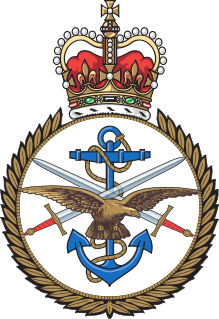
The British Armed Forces, also known as His Majesty's Armed Forces, are the military forces responsible for the defence of the United Kingdom, its Overseas Territories and the Crown Dependencies. They also promote the UK's wider interests, support international peacekeeping efforts and provide humanitarian aid.

A paramilitary is an organization whose structure, tactics, training, subculture, and (often) function are similar to those of a professional military, but is not part of a country's official or legitimate armed forces. Paramilitary units carry out duties that a country's military or police forces are unable, or sometimes unwilling, to handle.
A constable is a person holding a particular office, most commonly in criminal law enforcement. The office of constable can vary significantly in different jurisdictions. A constable is commonly the rank of an officer within the police. Other people may be granted powers of a constable without holding this title.

Search and rescue (SAR) is the search for and provision of aid to people who are in distress or imminent danger. The general field of search and rescue includes many specialty sub-fields, typically determined by the type of terrain the search is conducted over. These include mountain rescue; ground search and rescue, including the use of search and rescue dogs; urban search and rescue in cities; combat search and rescue on the battlefield and air-sea rescue over water.

Law enforcement in the United Kingdom is organised separately in each of the legal systems of the United Kingdom: England and Wales, Northern Ireland and Scotland. Most law enforcement is carried out by police officers serving in regional police services within one of those jurisdictions. These regional services are complemented by UK-wide agencies, such as the National Crime Agency and the national specialist units of certain territorial police forces, such as the Specialist Operations directorate of the Metropolitan Police.

The Defence Forces are the armed forces of the Republic of Ireland. They encompass the Army, Air Corps, Naval Service, and Reserve Defence Forces.

The Army Cadet Force (ACF), generally shortened to Army Cadets, is a national youth organisation sponsored by the United Kingdom's Ministry of Defence and the British Army. Along with the Sea Cadet Corps and the Air Training Corps, the ACF make up the Community Cadet Forces. It is a separate organisation from the Combined Cadet Force which provides similar training within principally independent schools.
Witness protection is security provided to a threatened person providing testimonial evidence to the justice system, including defendants and other clients, before, during, and after a trial, usually by police. While a witness may only require protection until the conclusion of a trial, some witnesses are provided with a new identity and may live out the rest of their lives under government protection.
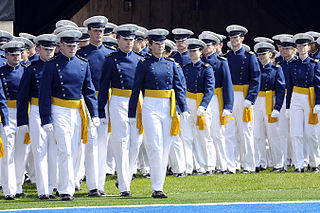
A cadet is an officer trainee or candidate. The term is frequently used to refer to those training to become an officer in the military, often a person who is a junior trainee. Its meaning may vary between countries which can include youths in voluntary youth organisations.
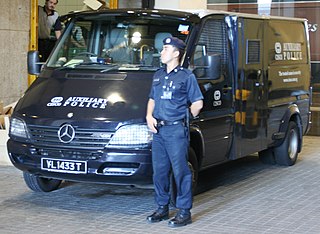
Auxiliary police, also called special police, are usually the part-time reserves of a regular police force. They may be armed or unarmed. They may be unpaid volunteers or paid members of the police service with which they are affiliated. The police powers auxiliary units may exercise vary from agency to agency; some have no or limited authority, while others may be accorded full police powers.

Auxiliaries are support personnel that assist the military or police but are organised differently from regular forces. Auxiliary may be military volunteers undertaking support functions or performing certain duties such as garrison troops, usually on a part-time basis. Unlike a military reserve force, an auxiliary force does not necessarily have the same degree of training or ranking structure as regular soldiers, and it may or may not be integrated into a fighting force. Some auxiliaries, however, are militias composed of former active duty military personnel and actually have better training and combat experience than their regular counterparts.

Staffordshire Police is the territorial police force responsible for policing Staffordshire and Stoke-on-Trent in the West Midlands of England. It is made up of eleven Local Policing Teams, whose boundaries are matched to the nine local authorities within Staffordshire.
Auxiliary constables or reserve constables are unpaid citizens in Canada who volunteer their time and skills to a police force. They are uniformed, unarmed members who perform a similar role to their UK counterparts in the Special Constabulary. Their main function is to supplement the police force with additional manpower, with duties varying by appointment, geographical location and the needs of the specific detachment/department.
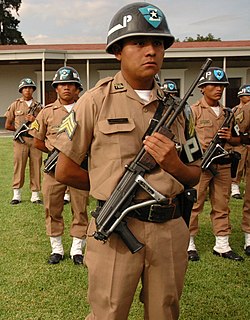
Provosts are military police (MP) whose duties are policing solely within the armed forces of a country, as opposed to gendarmerie duties in the civilian population. However, many countries use their gendarmerie for provost duties.

Law enforcement in the Republic of Ireland is the responsibility of Ireland's civilian police force, the Garda Síochána, commonly referred to as the Gardaí. It is responsible for all civil policing within the country and has been the only territorial police force since their merger with the Dublin Metropolitan Police in 1925.
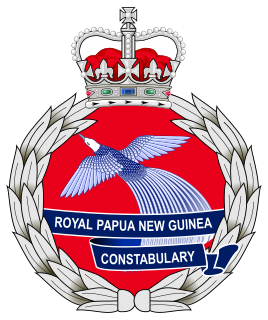
The Royal Papua New Guinea Constabulary (RPNGC) is a national police force with jurisdiction throughout all of Papua New Guinea.
Police Support Volunteer is a voluntary role within the ranks of British Police Forces that involves civilian and mainly office based duties. PSV schemes became popular after 2000 when forces were expanding and needed to be more connected to the community. At the start few forces had a civilian volunteer scheme but by 2010, 32 of the 43 police forces have PSV schemes. In the UK there are over 6,250 volunteers, who contribute over 500,000 hours a year voluntarily. It is estimated that the number of PSV's will increase by 70% next year to over 10,000 volunteers. The first PSV scheme was started in 1992 by Kent Police.

The United States National Neighborhood Watch Program is a neighborhood watch program run under Citizen Corps that focuses on residential areas through citizen involvement. Originally developed in the late 1960s, the National Sheriffs' Association (NSA) officially created the National Neighborhood Watch Program in 1972 to assist citizens and law enforcement.

BUNAC is an organisation that enables people to explore the world through work abroad and travel programmes. After starting as a not-for-profit members Club, it was taken over by Bunac Travel Services Ltd which was acquired by STA Travel in 2011. The 'BUNAC' brand and all associated work and volunteer abroad programme brand names are now owned by STA Travel. Previously, the company was owned by the non-profit British Universities North America Club in order to provide work and volunteer programmes for their members. Due to this, the term 'BUNAC' now refers exclusively to STA Travel owned products, and not the non-profit Club.
















